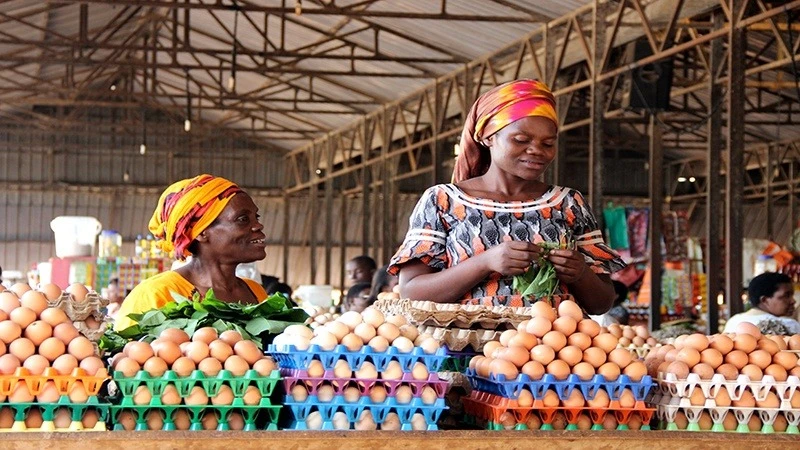Empowering micro businesses with seed capital, entrepreneurship skills

"I am happy to be in Katavi. This is my first time visiting this region. I am impressed by the quality of the roads. From Dar es Salaam to Mpanda, the roads show the government's commitment to improving the lives of Tanzanians. As CRDB Bank Foundation, we have come here to provide opportunities to help our fellow citizens increase their income,” said Ibrahim Isack, an Imbeju officer participating in the first phase of the awareness tour under the Imbeju Program.
Isack is among the few Tanzanians who have traveled across several regions and observed the government's efforts to drive development for citizens through various initiatives.
From his experience on this tour, he notes that communities need entrepreneurship training to uplift themselves economically.
"I've traveled from Katavi, Rukwa, Songwe, and on to Mbeya. All these areas have land favorable for agriculture and forests suitable for livestock farming, including beekeeping. People are eager to seize these surrounding opportunities, albeit on a small scale. They need support to rise further,” he added.
On this awareness tour, Isack and his colleagues from the CRDB Bank Foundation headquarters implementing the Imbeju Program visited several villages, wards, and districts in the southern highlands to offer entrepreneurship training, financial literacy, and assist participants in opening Imbeju accounts.
Over the 35 days they spent traveling, Isack said, they provided targeted education, working with every important stakeholder to reach as many people as possible.
zens are waking up. In every district council you visit, there are many groups of entrepreneurs. These groups reflect citizens' understanding that their strength lies in unity, recognized by the government, the private sector, and even religious institutions with programs to empower citizens," said Isack.
Imbeju, a Bantu word meaning "seed," is a program run by CRDB Bank Foundation aimed at empowering small entrepreneurs by expanding their businesses through banking services.
Launched last year, the program has reached thousands of citizens through its seminars, benefiting participants by integrating them into banking services to start their journey toward building a sustainable and enduring economy.
Tully Mwambapa, CEO of CRDB Bank Foundation highlighted that many small entrepreneurs—from farmers and miners to food vendors and tailors—do not use banking services, thus lacking essential tools to grow their businesses when additional capital is needed.
Understanding this, Tully stated that CRDB Bank Foundation launched the Imbeju Program to address existing challenges, creating opportunities for low-income Tanzanians to benefit from bank support in business growth.
"In the Imbeju Program, we focus on four areas. First, we teach citizens about entrepreneurship, then provide them with financial literacy. Once they understand, we open an Imbeju account for them to qualify for enabling capital. This capital ranges from 200,000/- to 10m/-, with potential for more depending on the need," explained Tully.
In entrepreneurship, Tully emphasized the importance of participants increasing income sources from their activities. In every area, participants are encouraged to identify and seize available opportunities to enhance their personal income.
For each business, entrepreneurs are urged to consider ways to add value, which can yield additional income. For instance, a tailor could stock fabrics and sewing supplies at their shop. This way, when a customer comes in, they will pay for tailoring, fabric, and sewing materials—all in one place.
After establishing these income sources, it is essential to know how to use funds appropriately. Tully noted that Imbeju seminar participants are educated on safeguarding and expanding their capital and saving to grow or start other businesses to strengthen their income.
For an entrepreneur disciplined in financial management and setting up a savings plan, the Imbeju Account offers a secure and affordable solution, with no monthly fees or maintenance costs.
“An entrepreneur who attends our seminars or is informed by a fellow group member who attended qualifies for enabling capital with an Imbeju Account. Many people are taking advantage of this opportunity, which is why we saw the need to reach every region in the country to deliver this education and empower entrepreneurs,” emphasized Tully.
Regarding Imbeju officers' visits across regions to provide education, Tully said this initiative aims to ensure everyone eligible benefits from the Imbeju Program.
Tully remarked, “On August 31, we launched the Imbeju roadshow in the southern highlands. Our goal is to travel across the entire country. We have completed the first phase and are now preparing for the second phase in the central and western regions.”
Since the launch of the Imbeju Program, Tully noted that over 600,000 citizens have received training, and thousands have benefited from enabling capital to expand their businesses.
Imbeju seminar participants appreciate not only the entrepreneurship and financial literacy training but also the Imbeju Account, which offers secure savings.
Aziz Kigaza, a VICOBA Coordinator in Songwe District, said that before, their method of sharing cash in hand was risky, but having a bank account arrangement will help many avoid possible criminal activities.
“We used to hand over money directly. One of our members took a loan of 4m/-. That night, he was attacked, and they cut off his hand and took the money he had. It was heartbreaking. Some people, driven by greed, are willing to do anything when they see money,” explained Kigaza.
Fatuma Rajabu, a resident of Chunya Town, expressed her joy at owning a bank account after attending the Imbeju seminar. “I never had a bank account before. Now, I feel part of people who handle their affairs with caution. From now on, I will be saving my money in a secure place,” said Fatuma, who runs a food vending business.
In its efforts to enable citizens to tackle economic challenges they face daily, the government introduced the National Economic Empowerment Policy and the National Empowerment Act in 2004. This was done to ensure Tanzanians take control of their economy.
The National Economic Empowerment Policy, implemented by the National Economic Empowerment Council (NEEC) in collaboration with other stakeholders, provides guidelines for empowerment based on specific sector conditions. Every year, the government coordinates and monitors the implementation of economic empowerment activities.
The Council executes this responsibility by promoting and supporting economic activities initiated and managed by Tanzanians, giving them the opportunity to engage in economic activities, and encouraging them to save and invest in economic ventures.
An assessment of this policy’s implementation for 2021/22 shows Tanzania has 44,441 financial institutions, including 166 registered in 2022/2023. These institutions provided loans to a total of 5,035,031 clients.
All these efforts aim to reduce poverty and build a sustainable economy. Primary beneficiaries of empowerment services include farmers, fishers, livestock keepers, industrialists, business owners, athletes, artists, artisans, street vendors, and employees in both the public and private sectors.
Top Headlines
© 2025 IPPMEDIA.COM. ALL RIGHTS RESERVED

























